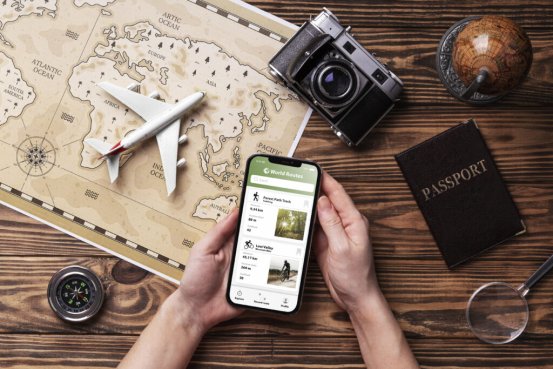Redefining Travel: How Small Business Booking Platforms Are Transforming the Industry
As travel becomes increasingly digital, small business booking platforms are gaining momentum by delivering personalized experiences and locally-informed insights. In both the UK and global markets, these platforms are reshaping travel with their human-centered approach, niche expertise, and innovative tools.
As travel becomes increasingly digital, small business booking platforms are gaining momentum by delivering personalized experiences and locally-informed insights. In both the UK and global markets, these platforms are reshaping travel with their human-centered approach, niche expertise, and innovative tools.

The Move from Traditional Agencies to Digital Booking
Travel planning has undergone a fundamental shift—from relying on physical travel agencies to embracing seamless, online experiences. The rise of internet-based platforms has empowered travelers to explore destinations, compare options, and finalize bookings with a few clicks. This transformation has not only increased convenience but has also allowed for more personalized and accessible travel planning.
How Small Platforms Are Standing Out
While giants like Expedia and Booking.com dominate the global market, smaller booking platforms are carving out a loyal customer base by focusing on personalization and authentic experiences. These platforms thrive by offering curated trips, unique accommodations, and services infused with local character—providing more than just utility; they craft compelling journeys.
Key Strengths of Small Travel Booking Platforms
Successful small-scale booking platforms often excel in the following areas:
Tailored Itineraries: Trips built around individual preferences, interests, and goals.
Exclusive Access: Hidden gems and boutique stays not typically available on mainstream platforms.
User-Friendly Interfaces: Clean, intuitive designs for smooth navigation on all devices.
Responsive Support: Direct communication and personalized assistance that instills trust and loyalty.
The UK’s Booming Small Travel Scene
The UK has seen a surge in small travel booking services, appealing to travelers seeking deeper, more meaningful experiences. Many UK-based platforms combine local expertise with tech-driven convenience, offering travelers an ideal mix of personalization and efficiency.
Leading UK Examples:
Secret Escapes: Curates high-end travel deals with exclusive discounts on luxury stays.
Mr & Mrs Smith: Specializes in boutique hotel bookings with a handpicked approach.
Holidaysplease: Connects travelers with personal advisors for a stress-free planning process.
What UK Travelers Appreciate:
Access to unique experiences at competitive prices.
Itineraries tailored to lifestyle—eco-tours, culinary adventures, and more.
Direct communication with expert advisors who streamline planning.
Expanding Global Reach
Many small travel platforms are now extending their services internationally, all while maintaining their personal touch. Their agile structures make them ideal for adapting to diverse traveler preferences across regions.
Spotlight: Growth in Sri Lanka
Sri Lankan travel platforms are a strong example of this expansion. They offer deep local knowledge to domestic and international tourists alike—crafting tours around cultural heritage, natural beauty, and cuisine. These services are delivered by locals, providing an insider’s perspective on the country’s best experiences.
Global Expansion Challenges:
Regulatory Compliance: Adapting to varying legal environments.
Localization: Creating culturally relevant communication and UX for new regions.
Operational Complexity: Offering support and services across different time zones.
Free Booking Platforms: Benefits and Limitations
Some platforms operate on a freemium model, offering users access without upfront payment. These attract budget-conscious travelers and monetize through affiliate links or advertising.
Pros:
No booking fees, ideal for price-sensitive users.
Basic features sufficient for straightforward travel needs.
Cons:
Limited customization or specialty options.
Lower service reliability and minimal support in case of problems.
Category | Paid Platforms | Free Platforms |
Support Services | Full, hands-on | Basic or self-serve |
Customization | High | Minimal |
Business Model | Subscription/fees | Ads/affiliates |
Reliability | Generally strong | Variable |
Frequently Asked Questions
Why are small booking platforms gaining traction?
They offer immersive, personalized experiences that go beyond standard offerings—ideal for travelers looking for authenticity.
Are free booking platforms effective?
They work well for simple trips, but may lack the depth or support needed for more complex itineraries.
What’s the main advantage of smaller platforms?
Their specialization and attention to customer service give them an edge in delivering memorable, tailored experiences.
What’s Next for Small Travel Booking Platforms?
Smarter Tools with AI
Expect small platforms to leverage machine learning to predict traveler needs and recommend hyper-relevant options based on past behavior.
Emphasis on Sustainability
As eco-conscious travel rises in popularity, more platforms are showcasing green accommodations, ethical excursions, and low-impact travel planning.
Stronger Local Partnerships
By collaborating with local businesses, guides, and hosts, platforms can offer deeper cultural connections and support local economies in meaningful ways.
Final Thoughts
Small business travel platforms are no longer on the fringes—they’re becoming essential players in modern travel. With a focus on customization, local flavor, and dedicated service, these platforms deliver rich, authentic experiences that resonate with today’s travelers. In a world where travelers seek more than just destinations, small booking platforms offer journeys with soul.

Unlocking the Value of Electronic Medical Record Systems

2025 Honda CR-V EX: Crafted for Comfort, Built for Performance

Understanding Business Call Center Answering Services

中古品リユースが切り拓くサステナブルな未来

2025 Honda CR-V EX – Smart, Spacious, and Stylish






